Preparing for your trip, you want to know how to behave in Bali? Look no further since, in this post, I’m preparing you for some culture clashes you should avoid on the so-called Island of Gods.
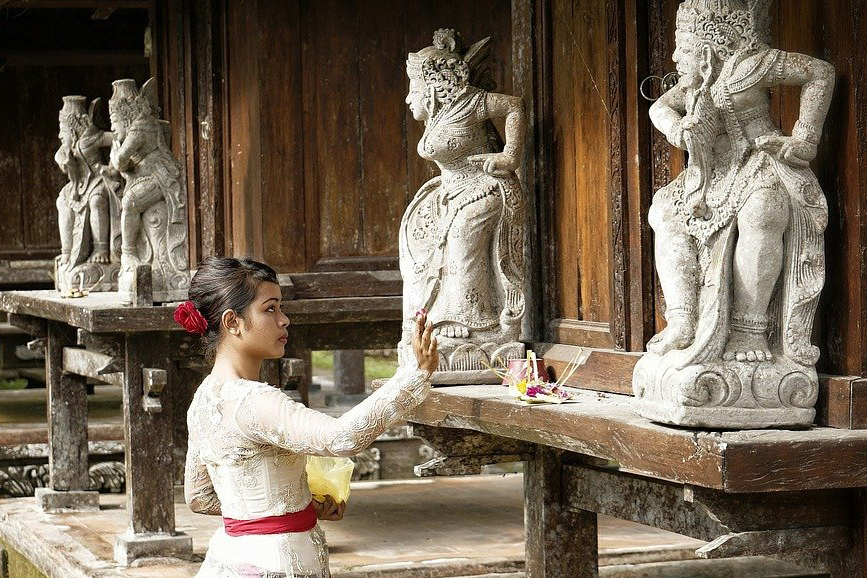
In Bali, there are many unwritten and unspoken rules. Most of them are very similar all over Asia.
However, the Balinese are far too polite and bashful to point out that you are about to transgress one of their common rules.
If you misbehave, they bark at you in Italy, point at you in Germany, and roll their eyes at you in France.
None of this will happen in Asia, namely in Bali.
But don’t think people won’t notice. You’ll be the boorish ugly tourist.
Yes, apparently, they will let it go. But on the inside, they will mutely bark, they will invisibly point and imperceptibly roll their eyes.
At Temples
In Bali, spiritual ceremonies are taken very seriously. Visitors are often admitted, but need to respect some simple rules.
Do
You always have to wrap a sarong around your hips – even if you are wearing long pants. Locals also wear a temple scarf around their waist. Foreigners don’t need necessarily to do so.
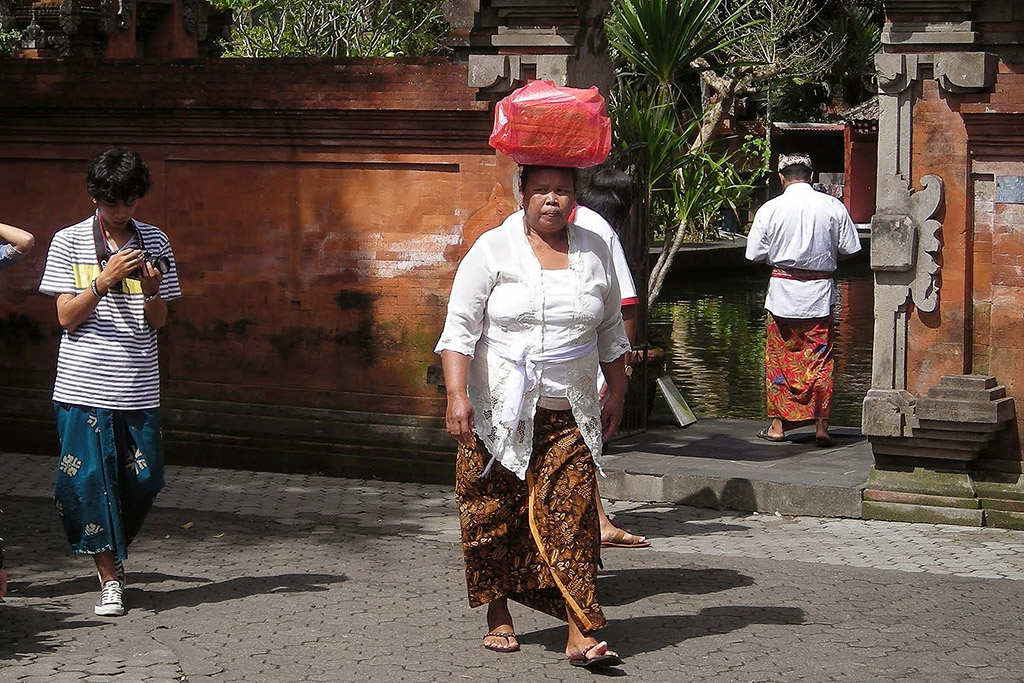
Often, you can rent sarongs at the entrance to temples. Or they will be someone selling them. Since these vendors cater mostly to desperate people who need a piece of fabric right away, their prices are ridiculously high.
Although you might be allowed to take pictures, you should turn off the flash – and preferably also the shutter sound. Even though it’s not a very loud noise, hearing this tone can be extremely distracting and disturbing.
If you are unsure of how to behave in a certain situation, look at how those around you are behaving. When in doubt, smile – and ask.
Cover Your Shoulders And Your Cleavage
Remember that you’re not supposed to expose your shoulders and arms. So if you are wearing a sleeveless top, you also need a scarf to cover your shoulders. Also, don’t show any cleavage.
Don’t
Frequently you’ll see religious offerings, so-called canang sari, at sacred places.
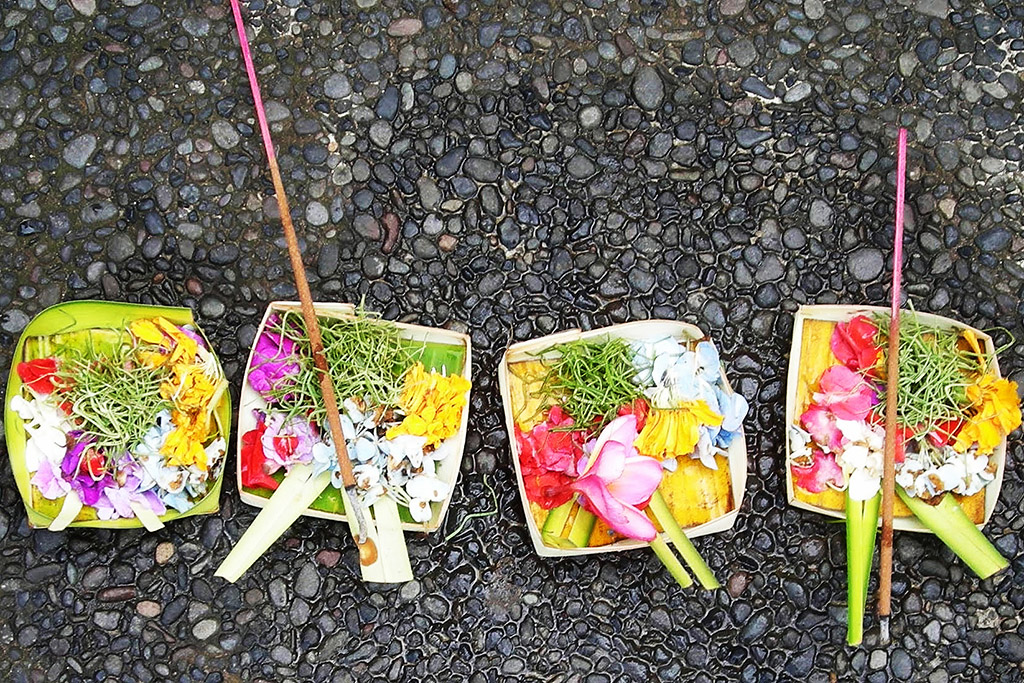
Also, the outside areas of shops and homes may have little woven bowls full of flowers, food, and incense. Hence, watch where you’re going. Never step on these arrangements as Balinese believe you will upset the gods.
No Blood
Don’t enter any temple during your time of the month.
Albeit this may be galling to some women. As a matter of fact, anyone – regardless of gender – with a sore or bleeding wound is considered impure and not allowed at any Balinese temple.
Hold Your Horses
As I explained above, religious ceremonies are a very important part of everyday life on the island. Therefore, don’t disturb or even interrupt any processions.
In Bali, processions occur frequently, particularly during holidays like Galungan and Nyepi. Obviously, local processions take precedence over your trip.
Hence, if you’re stuck due to a procession, do not honk your horn or try to intervene in any other way.
Clothing
Do
Despite being a popular tourist destination, most Balinese are very conservative. While they tolerate your skimpy apparel on beaches and at resorts, you ought to dress modestly on the street and at local markets.
You can wear shorts, but they should reach at least mid-thigh, better just above your knees. Also, your shirt or blouse should have at least short sleeves and not show too much cleavage.

You get more great tips on what to bring so that you can always dress appropriately in my post packing light – travelling in style.
Don’t
Interestingly, it was only after the introduction of Islam and ironically due to the contact with Western cultures that Javanese and Balinese women began to cover their breasts. Before, these women worked or rested topless. The sole reason for big breasted women or women with sagging breasts to cover their breasts was that they interfered with their work – not for moral reasons.
And even though you might spot locals taking a bath in a river in their birthday suit, you’re well-advised to wear a bikini or swimsuit at the beach. Topless tanning and bathing are not allowed in Bali.

(Photo: Tropenmuseum, part of the National Museum of World Cultures, COLLECTIE TROPENMUSEUM Meisje aan het weven op Bali TMnr 10014457, CC BY-SA 3.0)
Neither men should walk around in streets or on markets bare-breasted. As soon as you leave the beach or pool area, you should put on at least a t-shirt.
Nevertheless, especially in areas degenerated by mass tourism such as Kuta, you might spot some bare-breasted Balinese men. This is a foreign influence and would never be tolerated in the villages they come from. It’s regarded as offensive and ludicrous.
Shoes
Do
While you’re supposed to put on some clothes, you’re expected to take off your shoes.
Leave your footwear at the door as you are entering a temple or a private home. Since temples and homesteads are considered pure places, footwear is would sully their purity.
By the way, I’m neither a Hindu nor a Moslem, yet visitors have to leave their shoes at my doorstep – since I also consider them dirty.
However, as you are exploring Bali’s landmarks, you might want to pack a pair of socks in your daypack. The temple areas can get quite hot especially around noon so that you might be more comfortable not walking around barefoot.
Touch
Don’t
Modesty in Bali does not refer to clothing alone. People also behave more discreetly, and this includes touching. Amorous gestures are not displayed in public. Sometimes, young lovers are holding hands – however, this is a huge exception to the rule. They certainly don’t kiss in public.
Out of respect, visitors should also refrain from any form of romantic and intimate gestures.
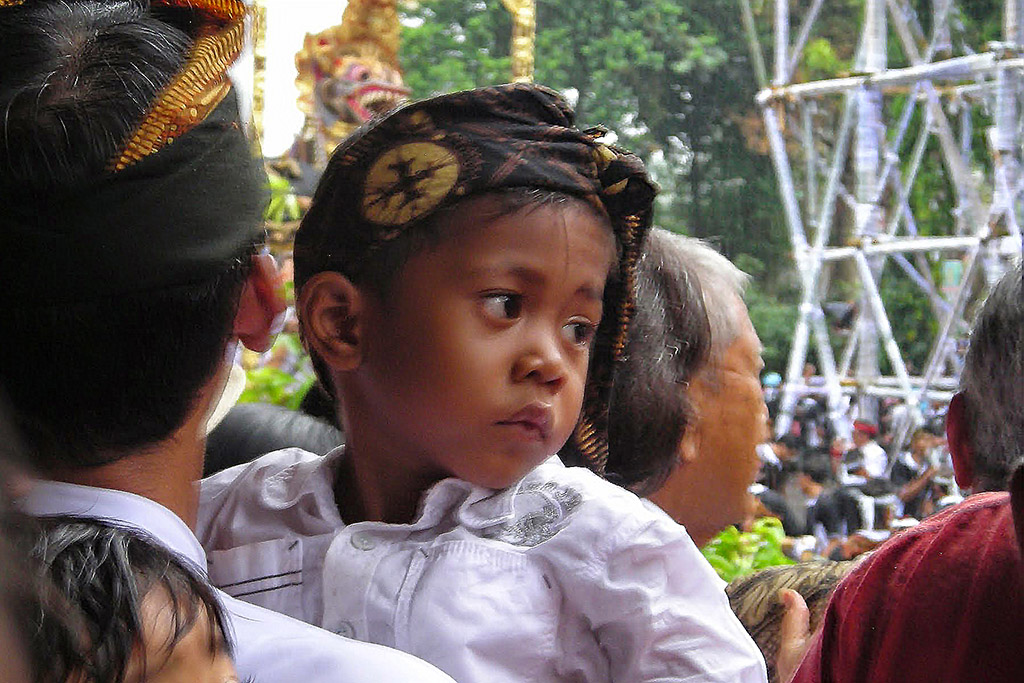
Also, never ever touch anyone’s head. Balinese people believe that a person’s soul resides in the head. This makes it the most revered part of the human body.
Hence, don’t touch anyone’s head or even hair. This applies also to children, therefore, don’t ruffle a child’s hair.
Salutation
Do
Balinese speak Bahasa Bali respectively Bahasa Indonesia – whereby bahasa simply translates to language. As I explained in my post Learning Languages for Travel, Bahasa Indonesia is actually one of the languages you can learn on babbel.
Anyway, in their language, Balinese address each other respectfully and distinctively according to the social status. You might want to address elders and authorities by using Pak for gentlemen and Mas for the ladies. In the everyday life, you can address men as Bapak and ladies as Ibu.
Gestures
When meeting people for the first time, offer them a handshake. However, as a man is introduced to a woman, he has to wait for her to offer her hand first. If she doesn’t, then leave it like that. If you are shaking an older person’s or an authority’s hand, it’s customary to slightly bow.

Although as Balinese deal with westerners, they offer handshakes, their traditional salute is the sembah. It is basically like the Indian Namaste: the joined palms are placed vertically against the sternum. You should accompany this gesture by saying om swastiastu, meaning may peace be with you.
Don’t
When greeting people, refrain from the far too intimate hugging. Also, the jovial petting on the shoulder, arm, or back is really inappropriate.
Smile
Do
Balinese also communicate by smiling, and they do it openly and often. Since this is actually very nice, when in Bali, do as the Balinese do: Just smile at everyone around you, and you will be appreciated and accepted.
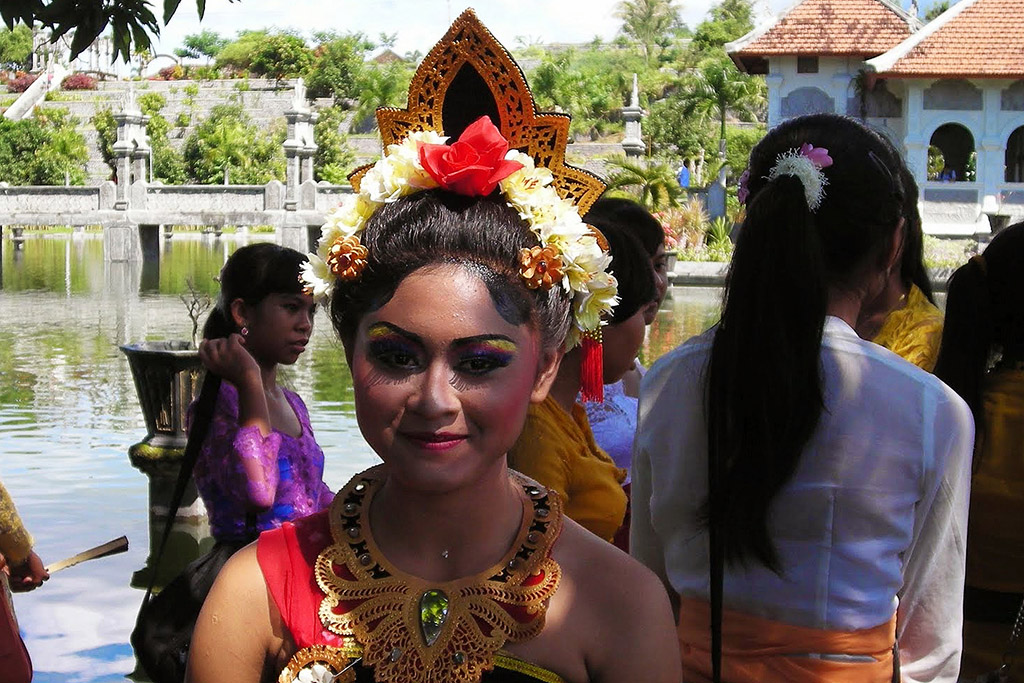
Also, don’t misread the signs. If a Balinese – no matter if a man or a woman -smiles at you, don’t mistake it for anything else. It’s not an invitation, just friendliness.
Feet
Do
While Balinese cherish the head as the body’s most revered part, they consider the feet as filthy.
Hence, you should never point at someone or something with your feet.
When sitting on the floor, you have to sit cross-legged with your feet under your knees, not with your legs stretched out showing the soles.
Don’t
When sitting on a chair, never cross your legs in the so-called 4-position, where one foot rests on the opposite thigh so that the sole might point at your neighbor.
I think that the US is the only part of the world where people not only walk around at their homes in shoes. They also tend to put their feet – barefoot or with their shoes still on – on furniture, namely tables.
This is a sacrilege – not only in Bali or in Asia but basically everywhere outside the US.
Fingers
Do
As you point at something, loosely grip your fingers and point only with your thumb instead of using the index finger.

If you are calling for someone, beckon that person by extending and waving your hand palm down.
Never use your index fingers when pointing or beckoning.
Hands
Do
You might know some of the rules about the feet or the pointing also from other cultures, namely Islamic countries. Also the use of the right and the left hand is identical: You use only the right one if you touch something – and most of all someone.
Obviously, when eating, you your exclusively the right hand – there is no exception to this rule.
Don’t
Never use your left hand to touch another person or even to hand something over. This applies also when handing over money as you are paying.
The left hand is considered dirty because in many cultures – including Indonesia – it is used for sanitary purposes. Gross, I know – that’s why you don’t use it.
Table Manners
Do
The use of the hands brings us to the table manners.
Balinese traditionally sit cross-legged on the floor. In a casual setting like for instance in villages, people eat with their hand and don’t use any cutlery. As you have learned above, they use exclusively their right hand.
If cutlery is used at all, it’s normally just a fork and a spoon, but no knife.

When you are invited to dine at a local Balinese home, do not eat up. Leave a little food on your plate to symbolize an offering to the gods. It also proves to the host that you had enough to eat.
Also, don’t be startled if your Balinese table neighbors keep silent throughout the meal. The urge to maintain a sparkling dinner conversation is a rather western thing.
Anger Management
Do
Regarding communication, there are many differences between westerners and Bali’s locals. People speak genially, rarely showing strong emotions. Since Balinese dislike any form of controversy, they keep situations low-key by smiling or by skirting.
Therefore, arguing is considered rude. Getting emotional makes you lose your face. You’ll be disregarded as someone who cannot control personal emotions.
Hence, keeping your calm will get you farther than raising your voice and demanding whatever you need to complain about.
Also, you should respect people’s dignity by expressing discomfort or even in private and never in front of thirds.
Don’t
Since Balinese are very easily embarrassed and saving their face is crucial, you should try to avoid controversial topics and confrontative situations.
Don’t get into discussions on sensitive topics such as religion and politics – especially in public.
You are a guest in a foreign country where life is proceeding at a different pace – metaphorically as well as literally. There is a noticeable lack of punctuality. A totally acceptable pro-forma excuse – that no one actually believes – is to blame Jam Karet which literally translates to rubber time but means traffic jam. As Jam Karet is used as an excuse, nobody will care if it’s true and just go on.
Humility
Even though Bali is relatively affluent compared to other Indonesian, most local people mean a very modest life. The average income among those working in the tourist sector is around 200 to 300 US$. And these is considered a good income.
Therefore, no matter how hard you’ve worked for your trip to Bali, you are always rich’n’priviledged. Which, even objectively speaking, you are. Many of the good people waiting your table or making your room can hardly afford visiting their home village on a regular basis.
Therefore, it is simply a respectful gesture refraining from bragging or wasting money. Not only does this awareness make you a better person tourist, at the end of the day, it even might save you from being duped or éven robbed.
The following aspects have less to do with customs, behavior, and manners. They are rather some practicable advice on how to stay safe and healthy while enjoying your stay in Bali to the max.
Beachlife
Do
Even though the sun is not shining unceasingly especially in Bali’s central region, you find yourself less than 1,000 kilometers south of the equator. Hence, you better put on sunscreen with a high SPF.
Stay in the shade, wear good sunglasses and a hat especially around noon. As I pointed out on various occasions in my post Keep Calm and Travel Solo, your well-being should always come first. Don’t be cheap when buying sun protection – and if you don’t find a comfortable shady place under a tree, rent a beach bed with a parasol for the day.
You’ll find them everywhere on Bali’s beaches. Especially if you are new, people will try to take advantage of you. Don’t let them charge you more than 20,000 to 30,000 max for a beach bed with a parasol for the entire day.
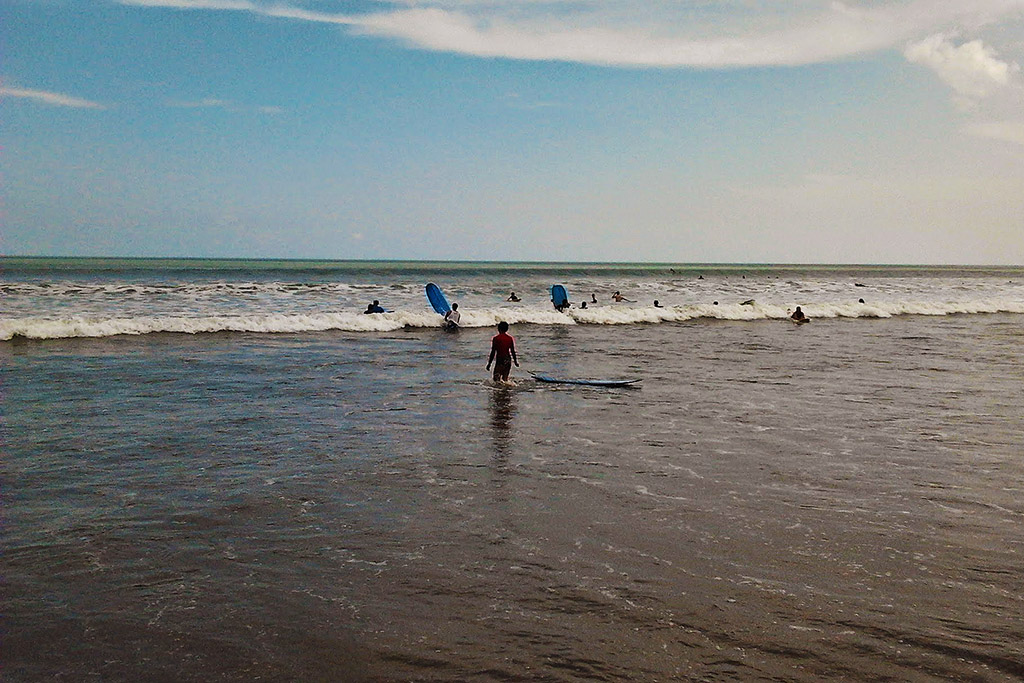
Bali’s beaches are beautiful and very popular with surfers. This quality, however, makes them dangerous for swimmers. There are strong and often treacherous undercurrents. Especially the island’s most popular beach stretching from Kuta via Legian all the way to Canggu is infamous for its rip tides and undertows.
Therefore, don’t attempt to swim as the local authorities raise the red flags on a beach.
Wildlife
Do
Avoid Mosquito Bites
You have probably heard of some diseases that are common in Asia. Most of them are transmitted by mosquitoes who love the tropical climate. On the beach, they will hardly bother you. But if you go for a walk or a bike ride through the hinterland, you should definitely use a good repellent.
Bali is not a malaria area. However, if you want to visit the Gili Islands for a longer period of time, you should find out about malaria prophylaxis from your doctor back home. It is transmitted by the Anopheles mosquito which is active at dusk and at night.
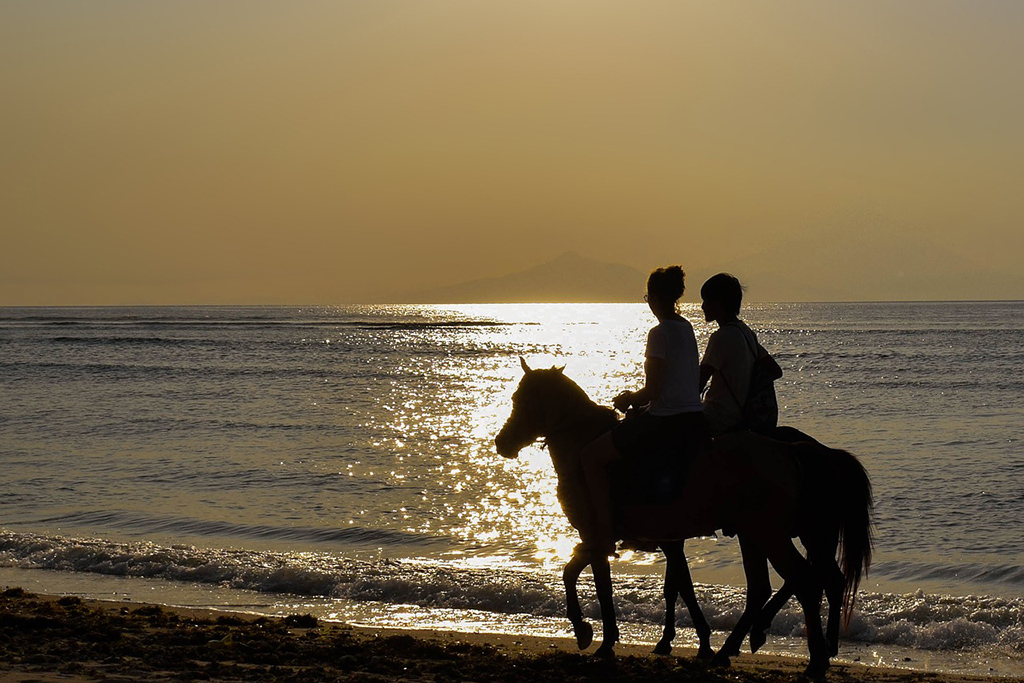
Dengue fever is also a common disease in Indonesia. The diurnal Aedes mosquito is the vector. It’s mostly active at dawn or dusk. Dengue fever occurs in Bali mainly during the rainy season. There is no prophylaxis against dengue fever.
Also, Chikungunya fever and Japanese encephalitis are transmitted by different kinds of mosquitos, hence make sure to avoid being bitten.
Don’t
Talking ’bout bites: Due to a large number of stray dogs, there is a certain risk of rabies in Bali. Even monkeys can be infected. Rabies is transmitted through the saliva of infected animals. The disease is difficult to treat and can be fatal for humans. So hands off dogs and monkeys – even if you find it so tempting. Also, don’t let the monkeys climb all over you.
The internet is full of reports on how people got aggressed and bitten by monkeys especially at the famous Monkey Forest in Ubud. There, the animals are used to humans and they know that people are carrying food and water. If you don’t give it to them voluntarily, they try to take it – yes, even out of your closed daypack.
But there are also reports of people who got bitten really badly without having brought food or played with the monkeys.

You should never underestimate the bite of an animal, no matter how small. Ever since rabies first occurred in Bali, some 100 people have died from it. Therefore, under no circumstances should one rely on self-diagnosis. Instead, you should always consult a doctor.
I’m not a doctor, obviously. However, apart from other vaccinations, I also got rabies shots before travelling to Southeast Asia as there is always a great chance to encounter aggressive monkeys or other disease-carrying animals. Better safe than sorry.
Transportation
Do
The most honest cab drivers in Bali work for the blue cars known as Bluebird Taxi and marked Bali Taxi. Any other company or individual driver is a hit or miss.
Since some other taxi operators dislike them – actually for their fairness and honesty – they collude with some hotels to ban Bluebird Taxis from their premises. Nevertheless, try to take a Bluebird Taxi whenever you can.
Don’t
Never just hop into a cab and off you go. Always check that the meter is on – or negotiate a reasonable fare at the beginning of your ride.
Smoking
Don’t
Don’t smoke in public areas. In 2011, a smoke-free bylaw went into effect on the island. Since then, smoking has been forbidden in most public areas, including hotels and restaurants.
Eating
Do
Be cautious as you are eating and drinking since it is the best prevention against the so-called Bali-belly, a cute way of describing diarrhea.
Stick to the old rule
boil it, cook it, peel it, or forget it
Mostly, diarrhea occurs during the first days abroad, hence, before the intestine adapted to foreign bacteria.
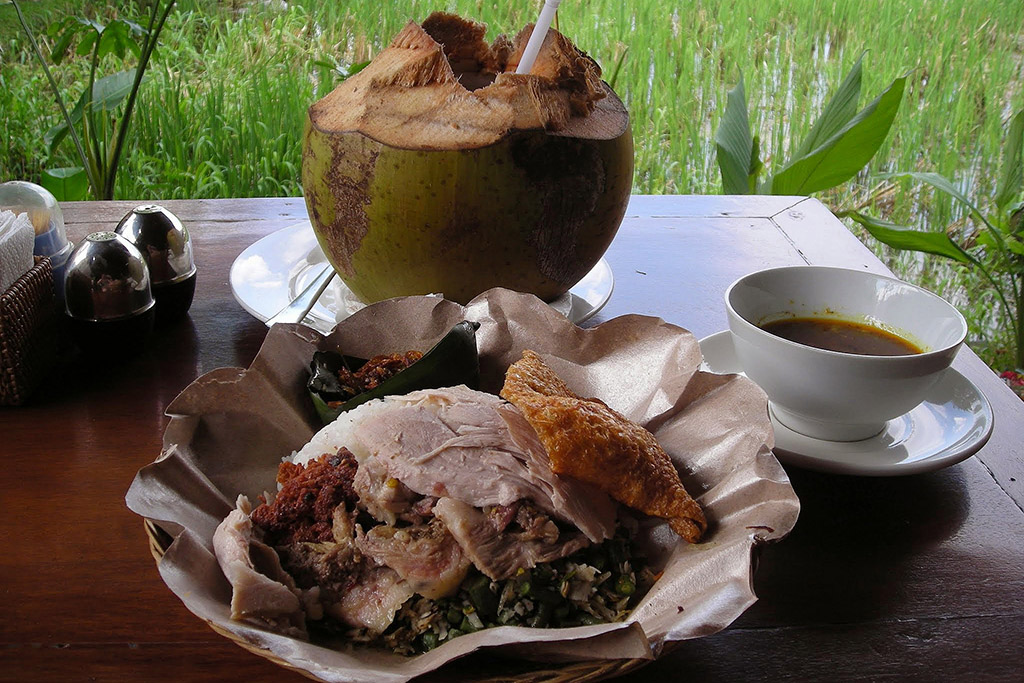
Usually, visitors are well after a few days. More serious intestinal infections with further side-effects might stem for instance from parasites. As I emphatically explained in my post Keep Calm and Travel Solo, your well-being should always come first. Hence, if you don’t feel well, go to see a doctor. I hope you’ve listened to my advice and have good health insurance.
Cure
Staying hydrated by drinking plenty of bouillon, fruit juices, or sugared tea is the top priority. Dehydration can be really dangerous, especially fro young children and the elderly.
If you can’t get electrolyte solutions from the pharmacy can be easily replaced:
Mix one liter of juice with one teaspoon of table salt, and two tablespoons of sugar. If you prefer, you can also stir one teaspoon of table salt and two tablespoons of sugar in one liter of black tea. Then, add the juice from two oranges.
If you don’t get better within 48 to 72 hours, or if the symptoms even worsen you should immediately consult a doctor.
There has been a vaccination against hepatitis A since 1992. However, there is no vaccination against hepatitis E, which is also transmitted via contaminated food and can be particularly dangerous for pregnant women.
Don’t
Bird flu is rampant throughout Indonesia and Bali. Therefore, you should touch neither birds nor cats. As cats eat birds, they can possibly become infected.
Also, avoid touching raw poultry meat.
If you have no direct contact with sick animals or their meat, there is no risk of you getting infected.
Drinking
Do
In Bali’s hot’n’humid climate, make sure to drink plenty of water to avoid nausea or even heat stroke. You should drink two to three large bottles of water per day.
Only drink bottled water. As you are buying it, make sure the lid is still sealed – even at restaurants.
To drink enough, I always carried a bottle of water – or sometimes soda – with me. Actually, this is not necessary since everywhere you go, peddlers with a variety of water and soft drinks are waiting for you. Their drinks might be a bit more expensive, on the other hand, they will be cooler than the one you are schlepping with you.
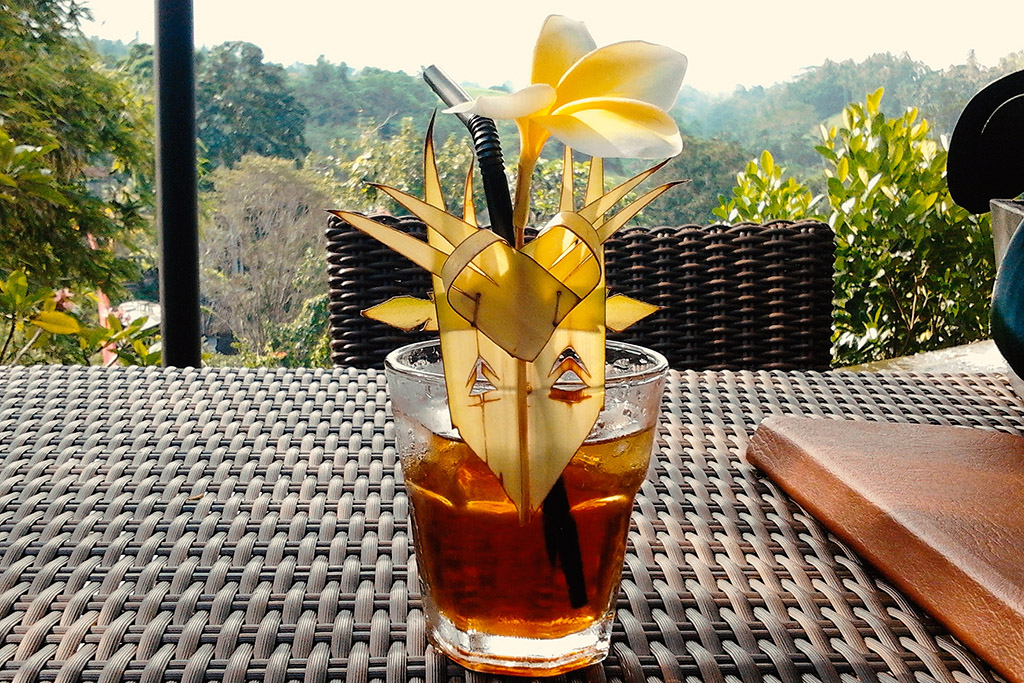
Don’t drink tap water, it’s really bad – everywhere, even at fancy hotels. Normally, every hotel supplies you with a complimentary small bottle of water per guest. In most cases, you’ll find these bottles in the bathroom since they are intended for brushing your teeth. Obviously, you can also drink that water.
Don’t
From my own experience – that I’m sharing in my post TRAWANGAN, MENO, or AIR – which island is for you? – I urge you to stay away from mixed alcoholic beverages like long drinks and cocktails.
Unfortunately, spiking drinks is a rather common practice in Bali’s party zone Kuta and on Gili Trawangang. Just put this in google search and you’ll see some pretty scary articles where people were intoxicated and raped. Since these drinks are being mixed with substances like Rohypnol, Methanol, or even some animal tranquilizers, they can make you seriously ill. It can provoke extremely low blood pressure, respiratory depression, coma, or even death. There were cases of people getting blind. Sadly, even fatalities were reported.
The problem is that while you can protect your drink from being spiked once you hold it in your hands, you don’t have under control what’s in the bartender’s bottle.
So what to do? Well, if you want a nice cocktail, get it exclusively at an established hotel bar, not at some random beach place.
If your drink smells or tastes funny, don’t drink it.
When you are partying at some casual beach place, don’t order mixed drinks. Stick to beer or even better soft drinks – and don’t leave your glass or bottle unattended at any time.
Drugs
Don’t
I hope you weren’t expecting a Do-section here?! After extended travels to Latin America and Asia, I know that some westerners are coming to these places to take drugs. I find this preposterous. Not only because the laws in these countries are often really harsh. It’s also not very smart to get wasted and lose control. Especially solo-travelling women should always stay in control and avoid making themselves volnurable.
This being said, I have to inform you that Bali’s drug laws are very strict and should not be jested. Indonesian Law No. 35/2009 lays down rigid penalties for people being caught taking narcotics such as marijuana, heroin, and cocaine.
There is actually life imprisonment for the possession and, shockingly, death penalty for trafficking.
Money
Do
The best way to obtain cash is to get it from an ATM, obviously. However, if you need to change cash, make sure to do so at one of Bali’s more reputable banks.
Otherwise, confide only in money changers that are approved by Bank Indonesia. Look out for a green sign saying Pedagang Valuta Asing Berizin or PVA Berizin which translates to Authorized Money Changer.
Obviously, you can change money at most hotel receptions and front desks. However, this should be only your last resort since their exchange rates are much worse than those of banks or authorized money changers.
Anything Else?
So this is my list of don’ts – and very few do’s – for your Bali trip.
Have you been to Bali?
Which cultural differences have you noticed there?
If you have something to add – hit me, I and the other readers will be grateful for helping to make this list more complete.
Here you can read about all the beautiful places I’ve visited in Bali.
Pinnable Pictures
If you choose to pin this post for later, please use one of these pictures:
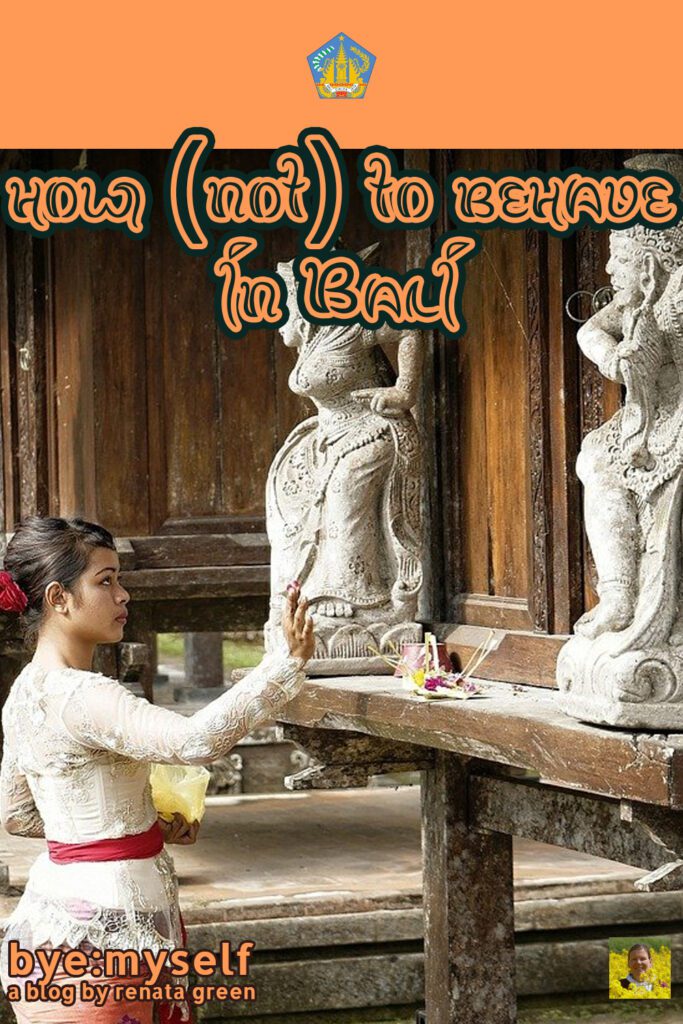
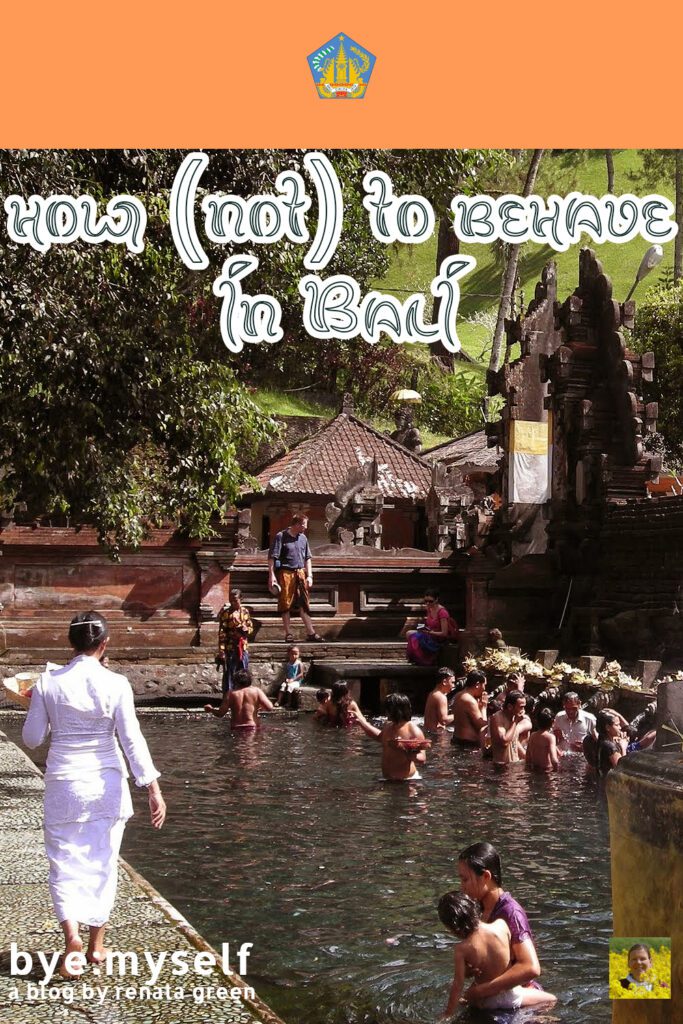
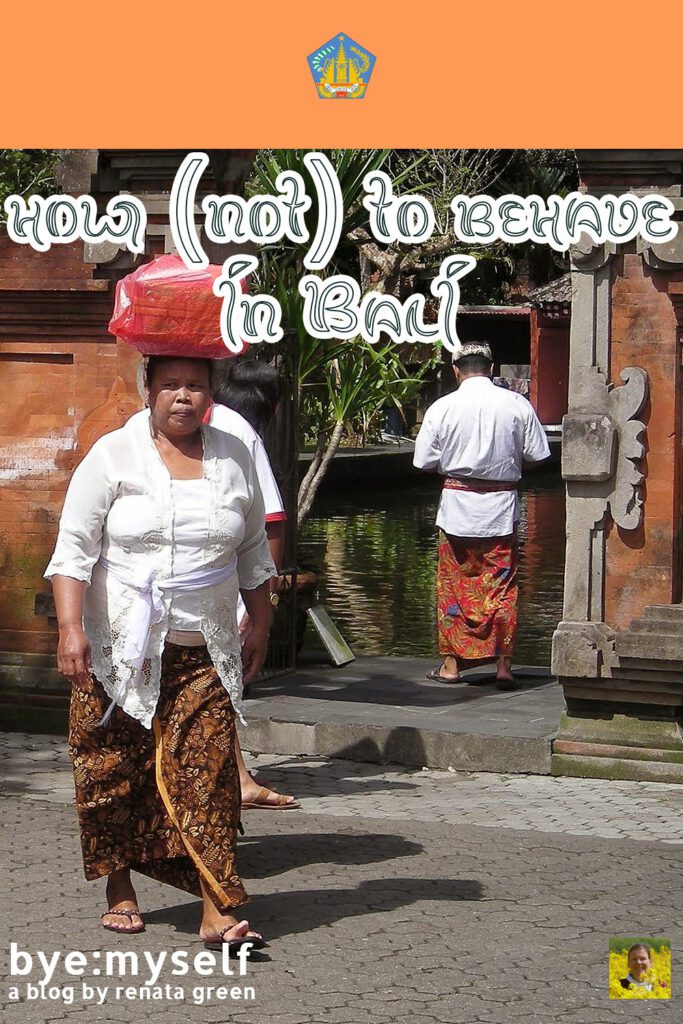
Note: I’m completing, editing, and updating this post regularly – last in January 2023.
Did You Enjoy This Post? Then You Might Like Also These:







